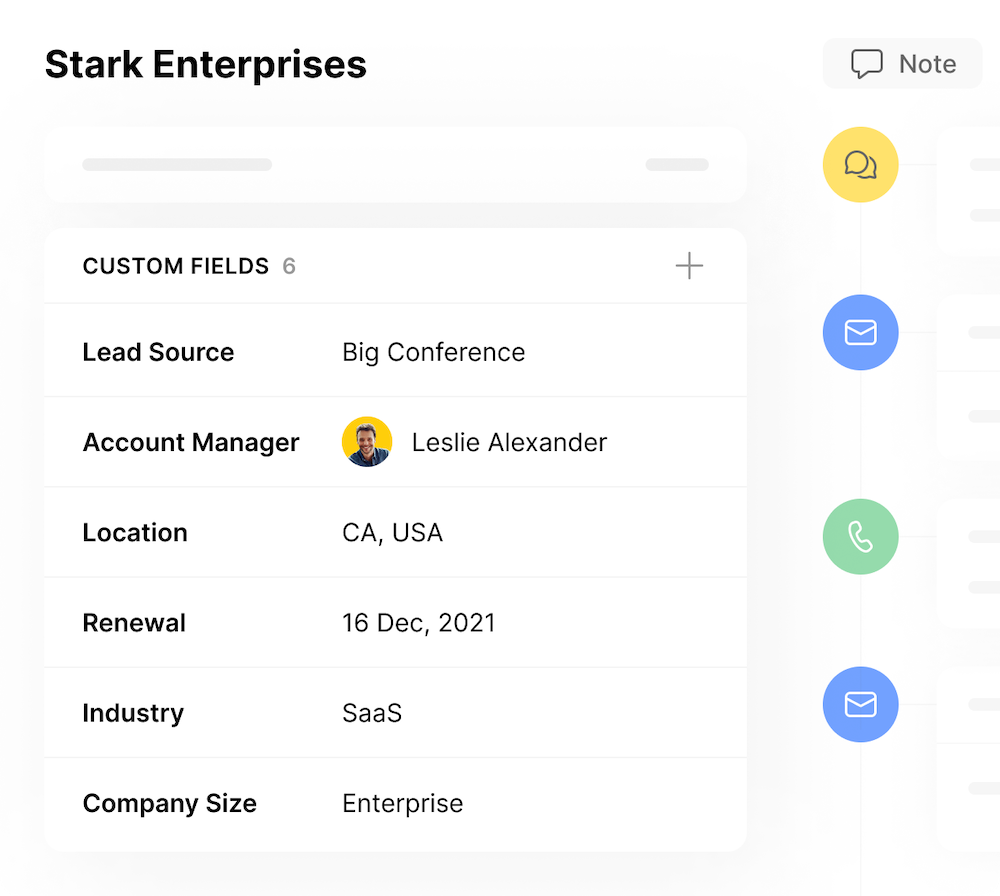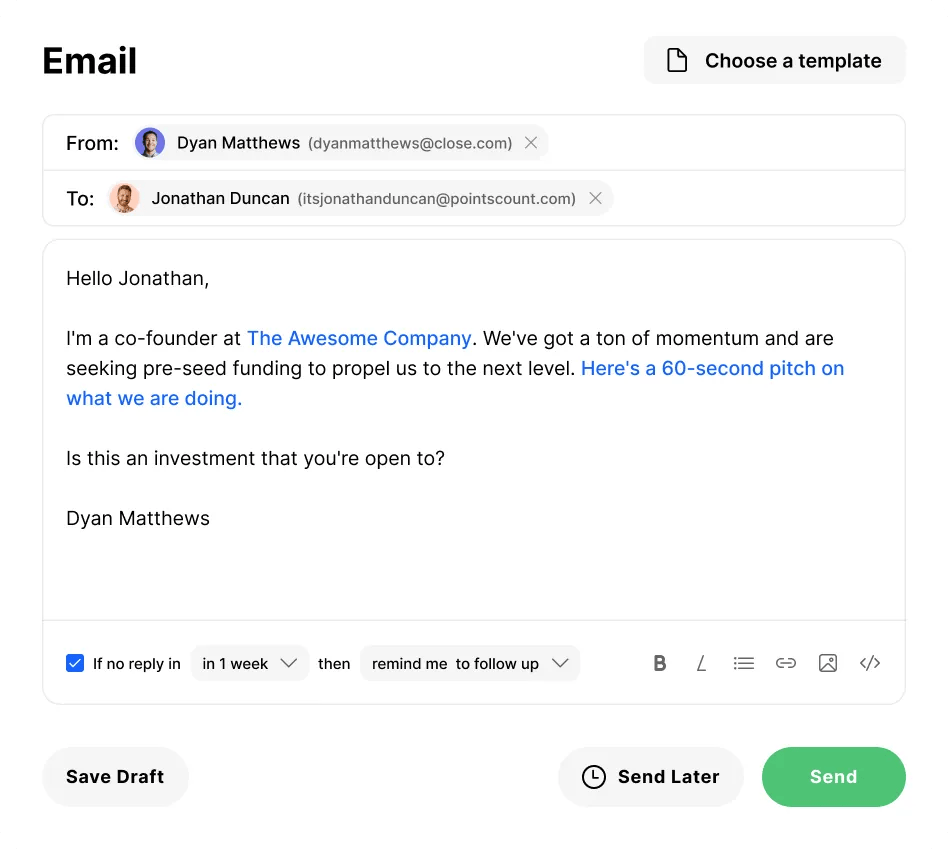Sales success isn’t just about making a sale. Instead, success is about building strong customer relationships, a bond with your customers that stands the test of time. This relationship is your lifeline to long-term success.
In sales, there’s always one constant––trust is the currency that reigns supreme. It’s what persuades a customer to choose you over a competitor. As per LinkedIn, a whopping 76 percent of B2B buyers prefer to work with vendors recommended by someone they know.
That’s why building strong customer relationships is essential.
Remember, you’re not just selling a product or service. You’re selling a promise. A promise of superior quality, of a seamless experience, of peace of mind. This is where customer relationships play an integral role.
Plus, a trusting customer is often a repeat customer. They’ll not only return for more but are also likely to bring in others. It’s like a domino effect that brings in more sales and referrals.
Building strong customer relationships isn’t just savvy business––it’s the golden ticket to long-lasting sales success. So stay tuned as we show you the ropes on how to fortify this relationship and supercharge your success.

The Importance of Building Relationships in B2B Sales
B2B sales aren’t your typical one-and-done business. They’re more like a marathon than a sprint. This race isn’t won by just having a killer product or service.
So how do customer relationships fit in, and why are they so important?
Improved Customer Retention
Bain & Company revealed in a study that a mere five percent increase in customer retention can boost profits by a mind-boggling 25 percent to 95 percent.
When you build strong relationships with your B2B customers, you’re not just securing a single sale; you’re laying the foundation for a long-term partnership.
Customers are much less likely to jump ship when they feel valued and appreciated.
This translates into lower customer churn rates and increased lifetime value––now that’s a win-win situation!
Access to Valuable Customer Feedback and Insights
By nurturing solid relationships, you encourage an open dialogue with your customers. They feel more comfortable sharing their thoughts and ideas, providing you with invaluable feedback.
This feedback is useful for improving your products, services, or overall customer experience. Consider this as having your very own focus group, guiding your business towards continuous improvement.
Increased Market Influence
Remember when we said loyal customers become evangelists for your brand? Well, they do more than just that. These satisfied customers can increase your market influence by boosting your reputation within their networks. This enhanced reputation not only drives more sales through referrals but can also strengthen your negotiation position with suppliers and stakeholders.
In B2B sales, it’s all about building relationships that not only drive revenue but also create an ecosystem of mutual growth and success. It’s not just about sealing the deal; it’s about sealing the relationship. So get out there, make connections, nurture them, and watch your business grow.
Learn more: Navigating Success: 15 Startup Sales Strategies for a Competitive Edge
Tips for Building Relationships in B2B Sales
If your eyes are set on the prize of long-term B2B sales success, you’re in the right place. So let’s dive in with some tips to help you build strong relationships.
1. Actively Listen
You’ve got two ears and one mouth––so use them in that ratio! Active listening is the cornerstone of building customer relationships.
When you’re talking with your B2B customers, really tune into their needs, worries, and aspirations. Display genuine curiosity, ask meaningful questions, and aim for clarity. Remember, your job isn’t to sell a solution but to solve a problem.
Let’s say you’re selling project management software geared toward large agencies. You need to listen to their daily pain points surrounding managing multiple deadlines, changing client expectations, and large teams of in-house and freelance workers.
What’s missing from their current setup? Do they need more customizable automation? Is their knowledge base awkward to update? Do they want a better integration into their existing CRM software?
By understanding their unique challenges, you can customize your offering to suit their specific needs.
2. Respond Fast
In the B2B world, time is money. Your responsiveness in dealing with queries, emails, or calls can make or break a deal. Plus, responsive communication is vital for building trust and maintaining strong customer relationships.
Show your customers that you’re there for them, rain or shine. Be reliable and prompt in your communication. Don’t let their questions simmer––address them proactively.
Take a minute to reflect. Which brands do you prefer doing business with? Those that offer timely responses through your communication channel of choice? Or brands that force you to wait in eternal online queues to speak with their customer service team? We bet it’s the former!
Consider how to make it easier for new and existing customers to speak with your support team. Whether you implement chatbots for real-time responses to simple requests, a self-service base, or support through social media, prioritize meeting customer needs for speedy support.
This kind of responsiveness reflects your dedication toward your customers and their success.
3. Provide Value
To build strong B2B relationships, you must provide value. Zero in on your customers’ pain points and offer solutions that alleviate them.
Share knowledge, industry trends, valuable resources, and proven practices. By consistently offering value, you establish yourself as a thought leader, earn their trust, and solidify your position as a vital business partner.
For example, if you run a home service repair company, you could create helpful videos or blog content highlighting how customers can fix simple issues in the home before calling a technician.
A regular email marketing campaign could add to this valuable content strategy.
4. Be Authentic
In the hustle of chasing your next sale, don’t lose your authenticity. Authenticity goes a long way in establishing strong B2B relationships.
Be real in your interactions. Dodge the sales-y lingo and inflated promises. Instead, build rapport and trust by being honest, transparent, and genuine. Only offer solutions that will genuinely help customers.
The reality of authenticity is that you may not always have the answer or the best solution for customers. So, in situations like that, just be honest with customers. Offer to refer them to another business that may meet their needs. Or if you’re not sure of the answer, just be direct and tell them.
This authenticity lays a solid groundwork for enduring partnerships and open communication. You’ll be surprised at how this customer-centric approach can help develop lasting relationships even if you don’t make a sale on your first round of contact.
5. Follow Up
Once you’ve got a foot in the door, don’t leave it at that.
Following up is crucial to nurturing your B2B relationships. But always follow up cautiously––you don’t want to become a pest. Think of your follow-up as another customer interaction that promotes a lasting emotional connection.
After initial conversations or sales, make it a point to stay connected. Send personalized follow-up emails, check in periodically, and lend a helping hand whenever needed.
To make your follow-ups more natural and authentic, think of ways to offer value. As a starting point, you may offer some incentives or discounts to new customers.
Or, if you have a particularly interesting conversation during one of your calls, you might send the customer an article about the topic of your call. The point is to do something that provides a great customer experience instead of following a template follow-up.
By maintaining regular communication, you reinforce the relationship and express your unwavering commitment to customer success.
Using the right sales tools will help you set up reminders for sending personalized follow-ups.
6. Prioritize Transparency
Transparency isn’t just a “nice-to-have;” it’s a must-have in the B2B realm. It’s all about being open with your customers about your operations, business decisions, and even mistakes.
Transparency cultivates an environment of mutual respect and trust. Plus, it reassures your customers that they can count on you, even when the chips are down.
So when you make a mistake, own up to it! Don’t just try and brush it under the carpet—be upfront and offer a solution.
Let’s say you’re new at a marketing agency. You’ve realized you’ve sold a customer the wrong monthly package of content and paid search ads. On reflection, you realize it’s simply not the right fit for their needs.
What should you do?
Schedule another call and explain that you can offer them a package that’s much better suited to their needs.
Doing so will give you a much better chance of maintaining customer satisfaction. And let’s face it—you’ll also sleep better at night.
7. Cultivate Empathy
Empathy is the ability to understand and share the feelings of others. It’s about putting yourself in your customer’s shoes. When you approach sales from a place of empathy, you’re not just selling a product or service; you’re providing a solution that you truly believe will make your customer’s life better.
So next time you’re on a call with an existing or potential customer, take the time to put yourself in their shoes. What does a positive experience look like to them? What would a negative experience look like?
Taking the time to empathize will help build more positive customer relationships and drive customer loyalty.
Mapping out the customer journey will also help you understand better how customers interact with your business and what their needs are at different moments.
Learn more: Build a Customer Intimacy Strategy: 12 Methods for Startups + Examples
8. Invest in Personalization
No one likes a cookie-cutter approach. To learn about each customer’s unique needs and preferences. Use this knowledge to provide personalized experiences that make your customers feel understood and valued.
Remember, every touchpoint is an opportunity to show your customer that you see them as a partner, not just a revenue source.
Where to start? Segment your customer base. Create segments for different buyers, use cases of your product, and goals. For example, if you offer virtual assistant services, some customers may be business owners, while others might be financial execs. Segment those different types of profiles, and personalize your interaction with each segment. It’s usually easy to do this in your customer relationship management software (CRM).
Knowing how to personalize your offering to each segment will give you a better chance of meeting customer expectations.

9. Promote Mutual Success
So, you want to make that sale and see your revenue spike. I get it. But remember, true success is a shared victory.
Let’s take an example: Suppose you’re selling project management software. It’s not enough to just highlight the features and tech-speak. What does your client really care about? It could be streamlining their process, boosting productivity, or reducing project timelines.
Instead of pushing your product, demonstrate how it aligns with their goals. Show them how the time-tracking feature can enhance their team’s productivity. Point out how the built-in communication tools will save time spent on back-and-forth emails.
Make it clear that your success mantra is their growth and success. That’s what I mean by creating win-win scenarios. When your customer’s business thrives with your solution, that’s a victory for you too. Doing this will give you a competitive advantage over your peers.
10. Foster a Long-Term Mindset
Here’s where many B2B sellers trip up. They get too caught up in the chase for the next quick sale. It’s a trap, folks! Sales isn’t about the fast buck; it’s about building and nurturing long-term customer relationships.
Let’s put this into action. Say, you close a deal with a client. Congrats! But don’t just pat yourself on the back and move on to the next lead. Follow up with the client. Ask them how they’re finding your product or service. Is it meeting their expectations? Do they need any assistance?
Maybe six months down the line, you introduce a new feature or service that could benefit this client. Reach out to them, not with a sales pitch, but as a trusted advisor sharing something that could help their business.
You see, it’s not just about that one-time sale. It’s about creating a long-lasting partnership. Show your customers that you’re not in this for the sprint; you’re in it for the marathon.
Prioritize Building Strong Customer Relationships for Long-Term Sales Success
Long-term sales success isn’t just about closing a deal. It’s about forging a bond with your customers built to last.
If you take away only one thing today, remember building good customer relationships isn’t a one-off project. It’s an ongoing commitment.
You’ve got to put in the work, day in and day out. Mix things up with personalized communication, proactive problem-solving, and a continual quest for improvement. With these strategies up your sleeve, you won’t just strengthen your customer relationships, you’ll stand head and shoulders above the competition.
Trust me, your sales graph and customer retention rates will thank you!
